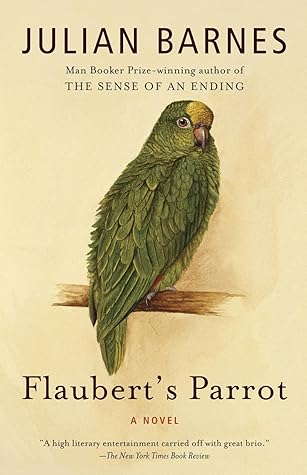More on this book
Community
Kindle Notes & Highlights
The movements of her heart slowed down beat by beat, each time more distant, like a fountain running dry or an echo disappearing; and as she breathed her final breath she thought she saw, as the heavens opened for her, a gigantic parrot hovering above her head.’
both of them had lives stained
Is the writer much more than a sophisticated parrot?
he was not cut out for success, and his duty was therefore to ensure only that he failed in a correct and acceptable fashion.
we are all caged birds, and that life weighs the heaviest on those with the largest wings:
I don’t much care for coincidences. There’s something spooky about them: you sense momentarily what it must be like to live in an ordered, God-run universe, with Himself looking over your shoulder and helpfully dropping coarse hints about a cosmic plan.
I prefer to feel that things are chaotic, free-wheeling, permanently as well as temporarily crazy – to feel the certainty of human ignorance, brutality and folly.
And yet sometimes I wonder if the wittiest, most resonant irony isn’t just a well-brushed, well-educated coincidence.
Her eyes are blue: innocence and honesty. Her eyes are black: passion and depth. Her eyes are green: wildness and jealousy. Her eyes are brown: reliability and common sense. Her eyes are violet: the novel is by Raymond Chandler.
When you’re young you prefer the vulgar months, the fullness of the seasons. As you grow older you learn to like the in-between times, the months that can’t make up their minds. Perhaps it’s a way of admitting that things can’t ever bear the same certainty again. Or perhaps it’s just a way of admitting a preference for empty ferries.
Style is a function of theme. Style is not imposed on subject-matter, but arises from it. Style is truth to thought. The correct word, the true phrase, the perfect sentence are always ‘out there’ somewhere; the writer’s task is to locate them by whatever means he can.
‘The author in his book must be like God in his universe, everywhere present and nowhere visible.’
In life, we make a decision – or a decision makes us – and we go one way; had we made a different decision (as I once told my wife; though I don’t think she was in a condition to appreciate my wisdom), we would have been elsewhere.
After all, if novelists truly wanted to simulate the delta of life’s possibilities, this is what they’d do. At the back of the book would be a set of sealed envelopes in various colours. Each would be clearly marked on the outside: Traditional Happy Ending; Traditional Unhappy Ending; Traditional Half-and-Half Ending; Deus ex Machina; Modernist Arbitrary Ending; End of the World Ending; Cliffhanger Ending; Dream Ending; Opaque Ending; Surrealist Ending; and so on.
but every so often we are tempted to throw up our hands and declare that history is merely another literary genre: the past is autobiographical fiction pretending to be a parliamentary report.
You’ll open the bag and be putting your face into a bad marriage.
A quota system is to be introduced on fiction set in South America. The intention is to curb the spread of package-tour baroque and heavy irony. Ah, the propinquity of cheap life and expensive principles, of religion and banditry, of surprising honour and random cruelty.
Gustave taught Caroline about literature. I quote her: ‘He considered no book dangerous that was well written.’


